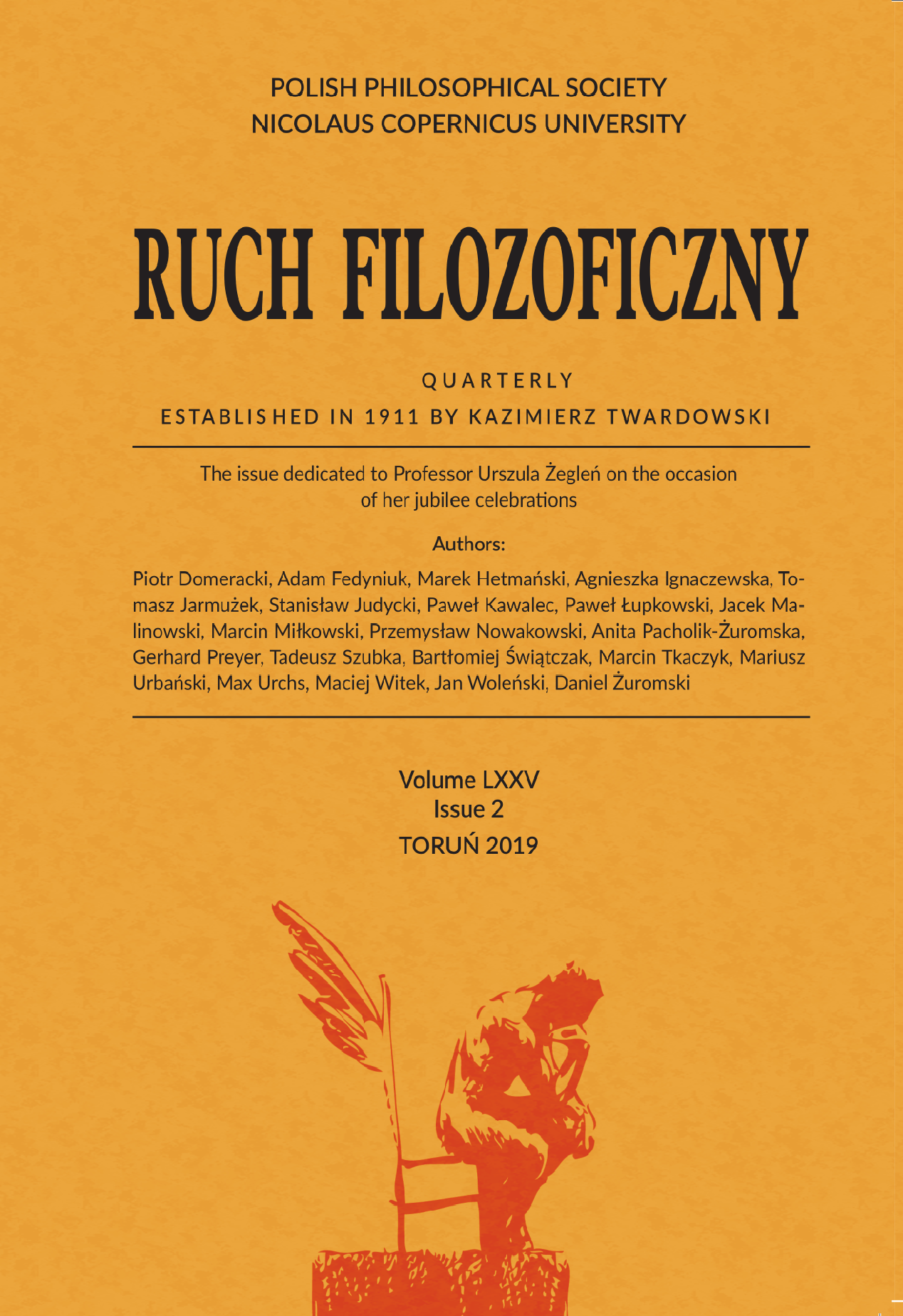Expressive Power of the Positional Operator R: a Case Study in Modal Logic and Modal Philosophy
DOI:
https://doi.org/10.12775/RF.2019.022Keywords
expressive power, modal logic, positional logic, possible worlds, realization operator, reductionAbstract
Theories of modal notions belong to subjects of permanent study for logicians as well as all philosophers. We describe some fundamental ideas concerning kinds of modal expressions. Then we deliver a concise introduction to basic concepts of modal logic with connectives M of possibility and L of necessity. We describe typical normal modal logic as sets of theorems as well as by means of relational semantics. In the focal points we present some important outcomes in the field of positional logic containing the operator R, with special emphasis on systems MR and MRQ. We show how relational semantics of typical modal logic may be reconstructed within positional logic MRQ with one binary predicate, and therefore normal modal logics turn out to be algebraically proper parts of positional logic or theories based on it. Some philosophical questions and insights are being raised on the ground of those formal research.
References
Hiż Henryk. 1951. Review: Jerzy Łoś, „Foundations of the Methodological Analysis of Mill’s Canons”. Journal of Symbolic Logic 16: 58–59.
Hughes George Edward & Maxwell John Cresswell. 1996. A New Introduction to Modal Logic. London and New York: Routledge.
Jarmużek, Tomasz & Andrzej Pietruszczak. 2004. “Completeness of Minimal Positional Calculus”. Logic and Logical Philosophy, 13: 146–162.
Jarmużek Tomasz. 2013. Jutrzejsza bitwa morska. Rozumowanie Diodora Kronosa (Tomorrow Sea–Fight: Diodorus Cronus’ Argument). Toruń: Wydawnictwo Naukowe UMK.
Jarmużek Tomasz. 2007. “Minimal Logical Systems with R-operator: Their Metalogical Properties and Ways of Extensions”. In: Perspectives on Universal Logic, ed. J. Bézieau, A. Costa-Leite, 319–333, Rome: Polimetrica Publisher.
Jarmużek Tomasz & Marcin Tkaczyk. 2015. Normalne logiki pozycyjne (Normal positional logics). Lublin: Towarzystwo Naukowe KUL.
Jarmużek Tomasz. 2018. On the Sea-Battle Tomorrow That May Not Happen. Berlin: Peter Lang.
Jarmużek Tomasz. 2006. “Rekonstrukcje Rozumowania Diodora Kronosa w ontologii czasu punktowego” (Reconstruction of Diodorus Cronus’ Argument in frame of ontology of time consisted of points). Analiza i Egzystencja 3: 197–215.
Karczewska Anna Maria. 2018. “Maximality of the Minimal R-logic”, Logic and Logical Philosophy 27: 193–203.
Łoś Jerzy. 1947. “Podstawy analizy metodologicznej kanonów Milla” (Foundations of methodological analysis of Mill’s canons). Annales Universitatis Mariae Curie-Skłodowska 2.5 F: 269–301.
Łoś Jerzy. 1948. “Logiki wielowartosciowe a formalizacja funkcji intensjonalnych” (Multivalued logics and formalization of intensional functions). Kwartalnik Filozoficzny 17, 1-2: 59–78.
Prior Arthur Norman. 1962. Formal Logic. Oxford: Claredndon Press.
Rescher Nicolas. 1968. “Chronological Logic”. In: Nicolas Rescher. Topics in Philosophical Logic. Dordrecht-Holland: D. Reidel Publishing Company.
Rescher Nicolas. 1968. “Topological Logic”. In: Nicolas Rescher. Topics in Philosophical Logic. Dordrecht-Holland: D. Reidel Publishing Company.
Rescher Nicolas & Alasdair Urquhart. 1971. Temporal Logic. Wien, New York: Springer Verlag.
Suszko Roman. 1949. Review: Jerzy Łoś, „Many-Valued Logics and Formalization of Intensional Functions”, Journal of Symbolic Logic 14: 64–65.
Świrydowicz Kazimierz. 2004. Podstawy logiki modalnej (Basics in Modal Logic). Poznań: Wydawnictwo Naukowe UAM.
Tkaczyk Marcin. 2009. Logika czasu empirycznego (The Logic of Physical Time). Lublin: Wydawnictwo KUL.
Tkaczyk Marcin. 2013. “Negation in weak positional calculi”. Logic and Logical Philosophy 22: 3–19.
Tkaczyk M. 2018. “Distribution Laws in Weak Positional Logics”. Roczniki Filozoficzne 66, 3: 163–179.
Tkaczyk M. & Jarmużek Tomasz. 2018. „Jerzy Łoś Positional Calculus and the Origin of Temporal Logic”. Logic and Logical Philosophy, DOI: 10.12775/LLP.2018.013. Published online: September 23, 2018.
Żegleń Urszula. 1990. Modalność w logice i filozofii. Podstawy ontyczne (Modality in logic and philosophy. Ontic foundations). Warszawa: Polskie Towarzystwo Semiotyczne.
Downloads
Published
How to Cite
Issue
Section
Stats
Number of views and downloads: 754
Number of citations: 1



